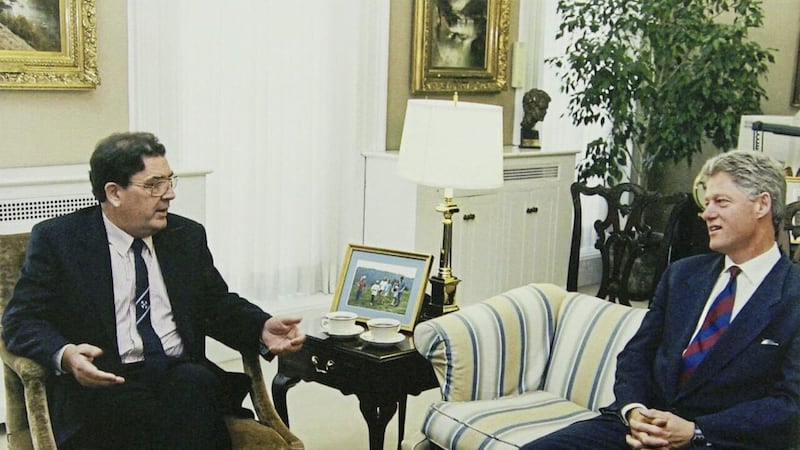Hard to define but eternally fascinating, leadership and the lack of it is a theme that hums through public life across this island and the bigger one next door.
Theresa May is hard to watch. And having asked for forgiveness without offering anything more than sympathy in return, the anointed leader of the global Catholic Church flew back to the Vatican, with a swipe at a survivor of clerical abuse during his airborne press conference. It was clumsy language at best, perhaps muddled in translation, surely ill-judged.
Over the past year the state of unionist leadership has been so dismal that it has crowded out reflection. This does nobody any good. May allegedly reads, watches and listens to only the least hostile commenters on her government. If she is indeed so cocooned, there is no evidence that it makes her any steadier or more coherent. Arlene Foster lives in a much smaller world in which disapproval must be hard to ignore. Her own failings are bad enough. There is another glum consideration.
From the days when Captain Terence O’Neill pushed for timid reforms and faced non-stop obstruction inside his cabinet, to that moment when Foster faced her MLAs to be told they would not stand for an Irish language act, unionist leaders have found no people to lead. One after another they have been forced out for ‘progressivism’. Nobody rallies to them. Half a century on, it must be time to face the fact that unionists refuse to be led.
Instead they tell themselves that the fault lies with nationalists, an argument much stronger while the IRA shot and bombed but in fact little different before and after the full-scale violence of the Troubles. Polite unionism has always condemned loyalist violence but always less than that by republicans, then having condemned it has shuffled off all responsibility, has turned, and still turns, a blind eye. It was a scrubby little version of the UVF that bombed O’Neill out of office, as he later wrote. It was the same small group of drunks that in 1966 killed the first victims of the Troubles. Foster is mocked for losing Stormont and weakening the Union. Her party’s dealings with the UDA barely register.
The newest batch of memos and other documents released by the Public Records Office has turned up snippy comment on former SDLP leader John Hume; not for the first time, though in striking contrast to opinions released at the start of the year. A YouTube presentation then by tireless porers Eamon Phoenix and Sam McBride found officials intrigued by Hume, curious about his strategy. At least, this was how historian Dr Phoenix read them.
This past week both he and McBride, political editor of the News Letter and Northern Ireland Political Editor for @theipaper have instead found Hume supposedly blocking progress in talks with unionists. Tom Kelly of this parish is quoted (in the News Letter) when he was one of the SDLP’s two vice-chairmen in November 1990 telling an S.A. Marsh of the NIO’s Political Affairs Division that Hume ‘was simply not interested in making progress within Northern Ireland; he was more concerned about relationships within Ireland as a whole.’
This vein of analysis no doubt fed NIO determination to see, against the evidence, flexibility in the unionist leadership of the time (Jim Molyneaux and Harry West) as against stubborn Irish nationalism.
But the patchwork of releases and documents still withheld leave an impression of grasshopper minds with little judgment. Perhaps the gaps create a picture that is unfair, and then again perhaps it accurately reflects NIO difficulty in thinking outside a unionist ‘norm’.
In any case Hume’s reputation easily withstands these tiny arrows. He didn’t engage with unionists: who? Harry West? Jim Molyneaux? Someone still a child when the first power-sharing arrangement in 1974 was brought down by a combination of political unionism and loyalist groups may not have understood what that meant for many others as well as Hume. He came to see an all-island context as essential through hard experience, not out of nationalist, republican dogma.
He had gone into public life not as a politician but as an individual reacting to Catholic/nationalist apathy and abstentionism. His first public statements were calls for involvement in northern society, sharp criticisms of old nationalism. He threw himself into the business of governing in the common interest.
When power-sharing was destroyed by mass obstruction he got his fingers badly burned. He kept on thinking, and doing, and so as a leader gave people hope.








